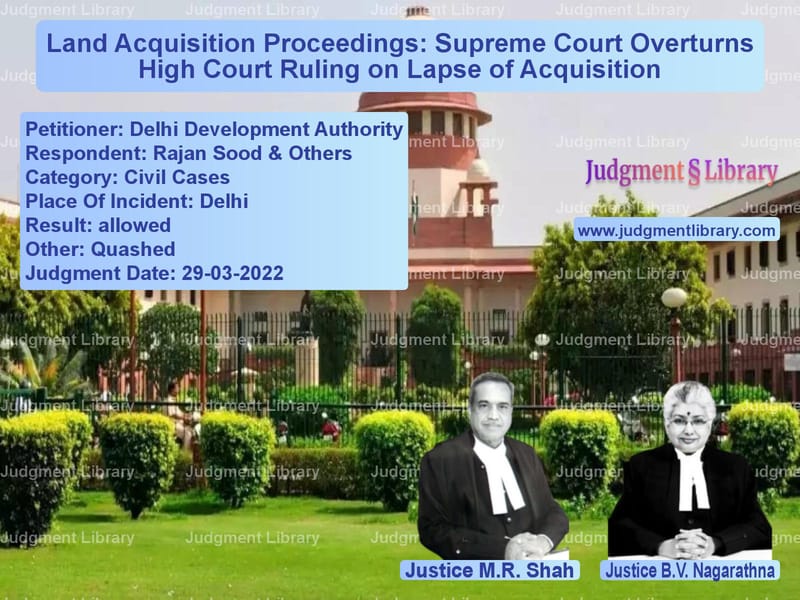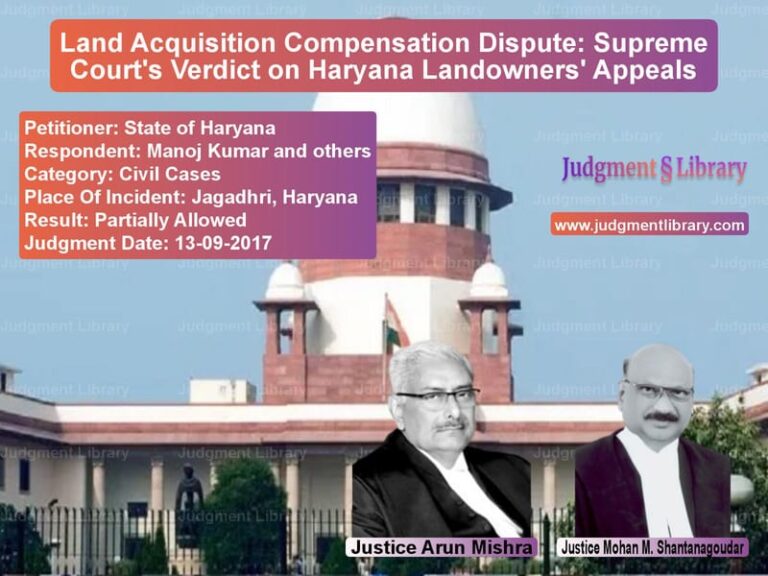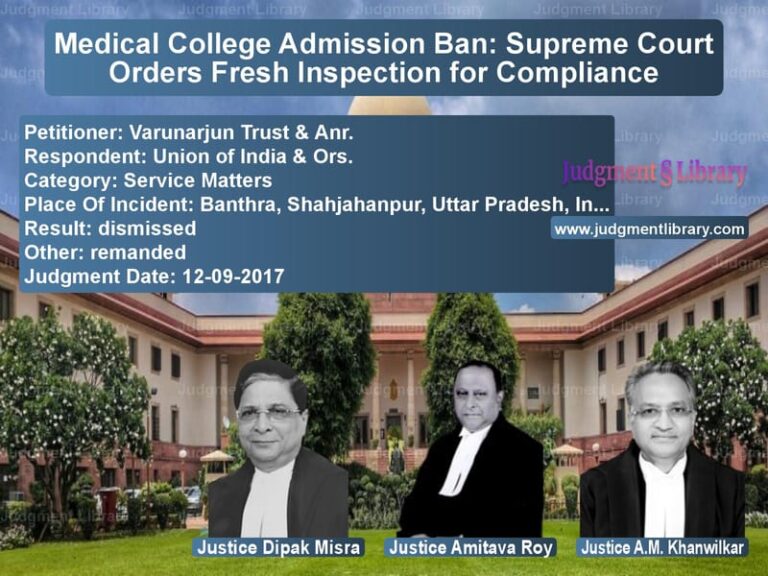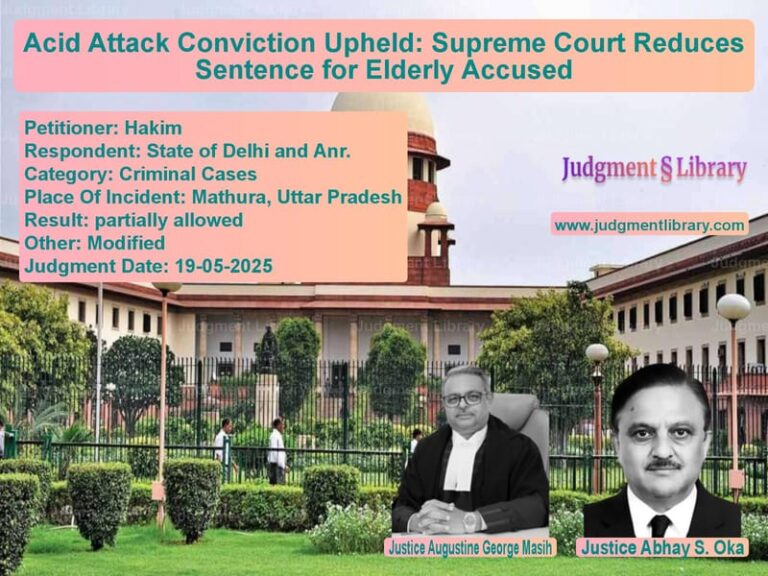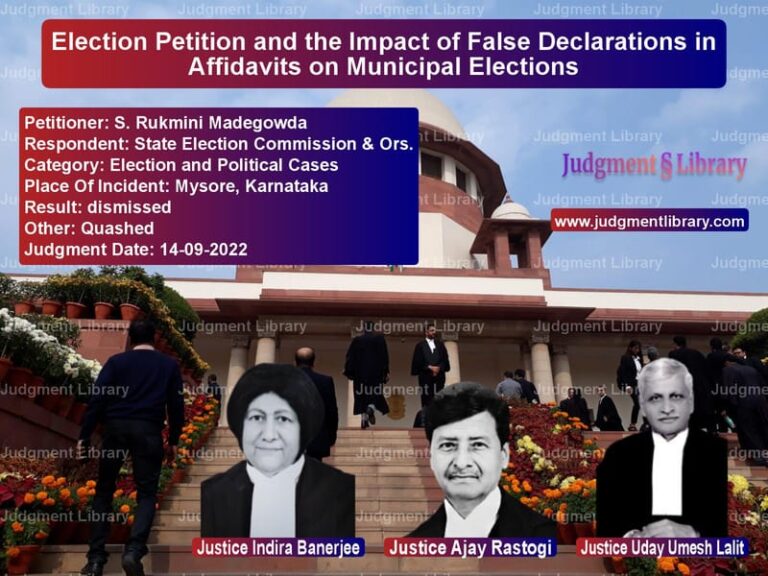Land Acquisition Proceedings: Supreme Court Overturns High Court Ruling on Lapse of Acquisition
The case of Delhi Development Authority (DDA) vs. Rajan Sood & Others revolves around the issue of whether land acquisition proceedings initiated under the Land Acquisition Act, 1894 had lapsed under Section 24(2) of the Right to Fair Compensation and Transparency in Land Acquisition, Rehabilitation and Resettlement Act, 2013. The Supreme Court ruled on whether the conditions for lapse were met and whether possession and compensation criteria had been satisfied.
This judgment is significant as it clarifies the legal interpretation of Section 24(2) of the 2013 Act and its applicability to ongoing land acquisition cases.
Background of the Case
The dispute arose over the acquisition of land in Delhi for development projects by the DDA. The key events in the case are as follows:
- 1986: Possession of the disputed land was claimed to have been taken by the authorities.
- 2011: The landowners filed a writ petition in the Delhi High Court seeking a declaration that the acquisition proceedings had lapsed.
- 2013: The Right to Fair Compensation and Transparency in Land Acquisition Act came into effect.
- 2016: The Delhi High Court ruled in favor of the landowners, stating that the acquisition had lapsed due to non-payment of compensation and possession remaining with the original owners.
- 2022: The Supreme Court overturned the High Court’s decision.
The landowners argued that they remained in possession and had not received compensation, while the DDA maintained that possession was taken and compensation was offered.
Legal Issues Considered
- Whether the land acquisition proceedings had lapsed under Section 24(2) of the 2013 Act.
- Whether the DDA had taken legal possession of the land.
- Whether the landowners were entitled to claim lapse based on non-payment of compensation.
- Impact of the Supreme Court ruling in Indore Development Authority vs. Manoharlal (2020) on the case.
Petitioner’s Arguments (Delhi Development Authority)
- The DDA contended that possession of the land was taken on September 23, 1986, through a legally recognized punchnama (record of possession).
- Compensation was offered to the landowners but was not collected by them.
- The High Court relied on Pune Municipal Corporation vs. Harakchand Solanki (2014), which was subsequently overruled in Indore Development Authority vs. Manoharlal (2020).
- The High Court failed to consider that judicial stays issued in 2011 prevented further action on compensation.
Respondent’s Arguments (Rajan Sood & Others)
- The landowners argued that they continued to physically occupy the land and that no actual possession was taken by the authorities.
- No compensation was paid or deposited in court, making the acquisition invalid.
- The High Court was correct in holding that the acquisition lapsed under Section 24(2) of the 2013 Act.
Supreme Court’s Judgment
The Supreme Court bench, comprising Justices M.R. Shah and B.V. Nagarathna, ruled in favor of the DDA and overturned the High Court’s judgment.
1. Indore Development Authority Case Precedent Applied
“The decision rendered in Pune Municipal Corporation is hereby overruled. The word ‘or’ in Section 24(2) is to be read as ‘nor’ or as ‘and’.”
The Court held that acquisition does not lapse if either possession is taken or compensation is paid.
2. Symbolic Possession Sufficient Under Law
“Once possession is taken under Section 16 of the 1894 Act, the land vests in the State, and there is no divesting under Section 24(2) of the 2013 Act.”
The Court ruled that symbolic possession recorded through a punchnama is legally valid.
3. Compensation Offer Considered as Payment
“If compensation has been offered but not collected, the obligation to pay is complete under Section 31(1) of the 1894 Act.”
The Court held that refusal to accept compensation does not invalidate the acquisition.
4. Judicial Stay Period Excluded
“The period covered by a stay order must be excluded from the five-year period under Section 24(2).”
The Court ruled that delays caused by court orders cannot be used to claim lapse of acquisition.
Key Takeaways from the Judgment
- The Supreme Court reaffirmed that symbolic possession is sufficient under land acquisition laws.
- Compensation offered but not collected fulfills the government’s payment obligation.
- Acquisition proceedings do not lapse simply because landowners refuse to accept compensation.
- Judicial stays issued during the acquisition process are to be excluded when determining lapse.
Implications of the Verdict
This ruling has significant implications for land acquisition cases across India:
- Government agencies can defend acquisitions even if landowners refuse compensation.
- Symbolic possession via punchnama will be recognized as valid possession.
- Landowners cannot exploit procedural delays to claim lapse of acquisition.
Overall, this Supreme Court ruling ensures that development projects are not stalled due to procedural technicalities and strengthens the government’s ability to execute land acquisitions lawfully.
Petitioner Name: Delhi Development Authority.Respondent Name: Rajan Sood & Others.Judgment By: Justice M.R. Shah, Justice B.V. Nagarathna.Place Of Incident: Delhi.Judgment Date: 29-03-2022.
Don’t miss out on the full details! Download the complete judgment in PDF format below and gain valuable insights instantly!
Download Judgment: delhi-development-au-vs-rajan-sood-&-others-supreme-court-of-india-judgment-dated-29-03-2022.pdf
Directly Download Judgment: Directly download this Judgment
See all petitions in Property Disputes
See all petitions in Landlord-Tenant Disputes
See all petitions in Damages and Compensation
See all petitions in Judgment by Mukeshkumar Rasikbhai Shah
See all petitions in Judgment by B.V. Nagarathna
See all petitions in allowed
See all petitions in Quashed
See all petitions in supreme court of India judgments March 2022
See all petitions in 2022 judgments
See all posts in Civil Cases Category
See all allowed petitions in Civil Cases Category
See all Dismissed petitions in Civil Cases Category
See all partially allowed petitions in Civil Cases Category

